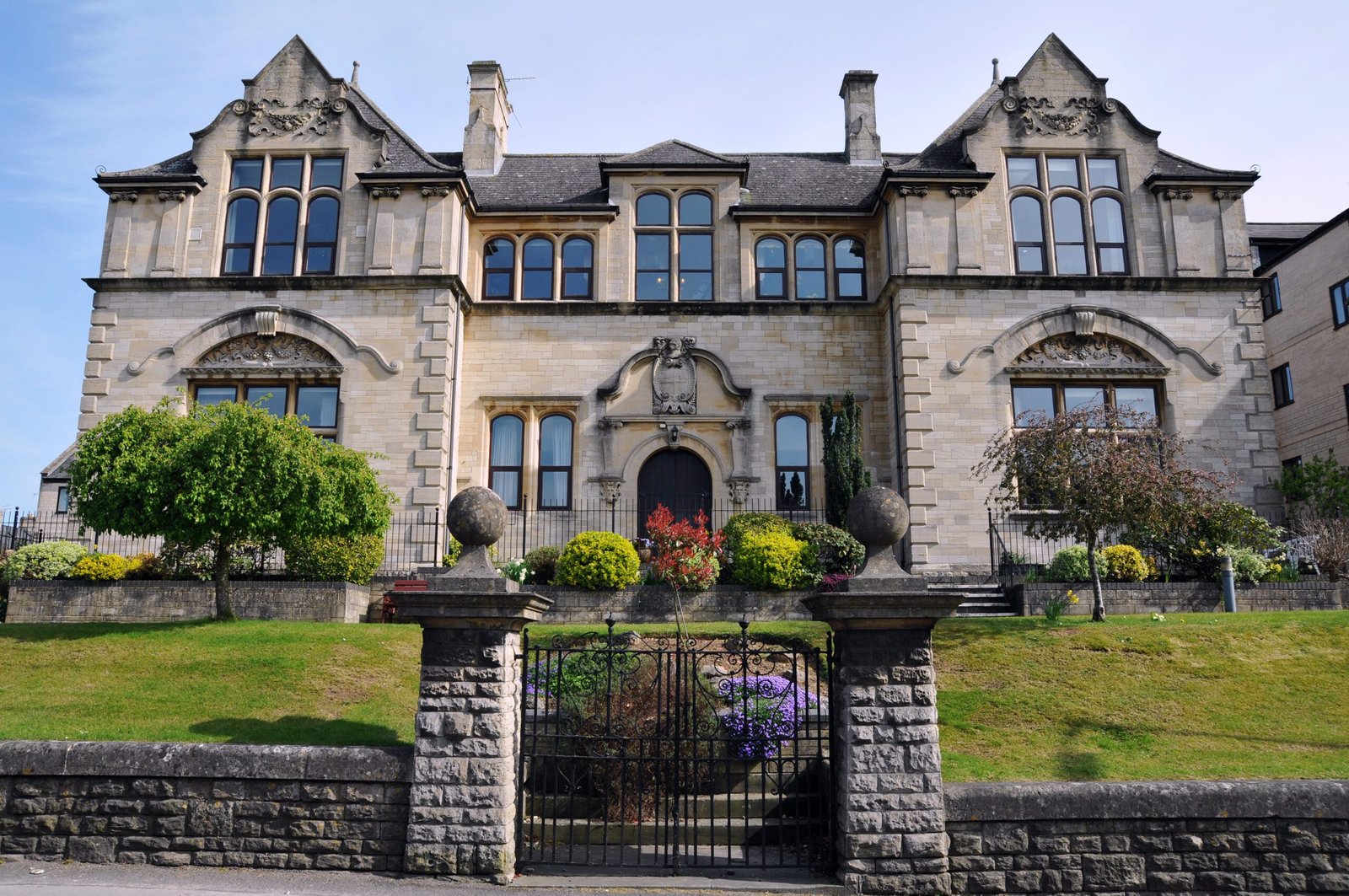If you have been with me ever since Agnes Quinn first arrived in Dennisonville [Trevorode the Defender], or only recently met three of Dennisonville’s eminent citizens, Bridey Ludlow, Ivy Leigh Hampton, and Muriel Porter in “Meeting of Friends,” you will be familiar with the name Asa Ludlow. He and Bridey will both play more significant roles in the upcoming Part V of The Magnolia Arms Chronicles. Here is a segment from an early chapter of the book underway. [The author is not “settled” on this photo as Oakley Manor, but it is a front runner at this point.]
The last remaining mansion in Dennisonville—the others having been converted to a music school, social venues, and inns—Oakley Manor was situated atop a small hill on the outskirts of town. Symmetrical and pretentious, the building was out of harmony with the cordial community. While spectators longed to see inside the Delahunty House, Hyacinth Hall, and Kimball Pines, the sight of Oakley Manor made them shudder and they were content to ogle the structure from a safe distance. Once highly regarded—forty years before—the dwelling sat empty, locked, vacated of the wealthy, shattered family who had inhabited it.
Constructed in 1926 by the original Benson Oakley, the residence was intentionally designed to exude superiority, and well-heeled society figures were only too willing to embrace the mystique. Being ‘seen’ at an Oakley dinner party became the highest ambition to which a Dennisonville resident could aspire. No ordinary person could picture himself thwacking the heavy bronze lionhead doorknocker (custom-ordered and imported from Florence, Italy) against the 12-foot tall black-enamel double doors. Most would have declined the privilege, even if formally invited. Benson Oakley, Jr., imperious heir of the house, was callous and corrosive, even—it was whispered—to his own family.
Nevertheless, local businesses celebrated when an Oakley event was announced. Average party throwers, mindful of a budget, might phone a great aunt for the loan of table linens or borrow a next door neighbor’s crystal punch bowl. The Oakleys were not limited by such financial constraints. Florists could expect orders for mounds of flowers, even if out of season, some requiring shipment from Raleigh. Caterers would be summoned to search out ostentatious recipes and purchase select ingredients for never-heard-of hors d’oeuvres and desserts. Once, an ice sculptor was flown in from Richmond to chisel a swan for the drink table.
On nights the Oakleys were entertaining, Malcom Ludlow, cab driver and self-appointed city historian, would offer riders the scenic route ‘by the Manor.’ He knew from experience those who agreed to pay the extra charge would not be content merely to drive by. They would ask him to stop, so they could get out and linger, hands grasping the wrought iron gates, as they pressed their faces between the bars, dazzled, oblivious to the meter running, while they gaped at the thirty-six lampposts lining the gray stone driveway leading to a glittering domain from which they would forever be excluded.
But that was decades ago.
Back when Benson Oakley, Jr., reaping the harvest of his father’s labor, deemed himself the most important man in town.
Back when his wife Hettie considered herself fortunate to have warranted his attention, and married him.
Back when she gave birth to two sons.
Back when the Oakley estate was diligently tended by an army of domestic staff.
The manor, thus well-maintained, endured.
The Oakleys did not.
After thriving during World War II, growing rich from military construction contracts, the family splintered halfway through the 50’s.
The 60’s saw the Oakley Furniture Company falter.
By the 70’s Oakley, Jr. himself was powerless. Felled by a stroke, he was a shadow of what he had once been. No longer fearsome and larger than life, he was silent and bent.
Heir to the family fortune and cause of their misfortune, Benson Oakley III had moved his wife, daughter, and son, into a more affordable home in the center of town, ‘so,’ it was reported, ‘the children could live closer to their friends.’
Because pity ran deep for Mrs. Oakley III (as it had for Mrs. Oakley, Jr.), the townspeople pretended to believe this.
The staff was discharged without severance; the house shuttered
And finally, a custom-built For Sale sign was affixed to the bolted gates. No price was listed—only numbers of bedrooms (8), numbers of bathrooms (5), the realtor’s contact information, and a firm proviso at the end: “Viewings by appointment only.”
It was this word, ‘viewings,’ which most grieved Asa Ludlow, Malcolm’s son, who, devoted to his father, had become a cab driver and town historian himself, and—as he had been brought up to do—revered Oakley Manor as a local treasure.
Asa had never aspired to any profession other than cabby. Perched on the front seat of Malcolm’s taxi, he had been schooled on “scenic routes” since he was a boy, and later created his own, once officially employed with Dennisonville Cabs.
He had tried to retire a few years back, even considering a move to Florida where warm weather would be kinder to his old knee injury. But after a few excursions along the east coast, a little golf, two Atlanta Braves’ games, Asa came home, and asked for his old job back. His story was he and his wife “couldn’t make it financially…you know how that is,” but the truth was he loved this town too much to leave it, loved carrying on his father’s legacy, loved parking under a tree, working a crossword puzzle while eating a bologna sandwich.
Asa’s straight-talking wife, Bridey, was overjoyed when he ‘came to his senses’ and brought her home. She shared his deeply ingrained love for their community, but found his passion for Oakley Manor tiresome and never understood his interest in ‘that old house.’





0 Comments